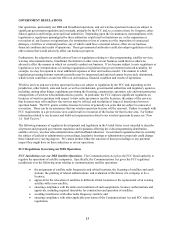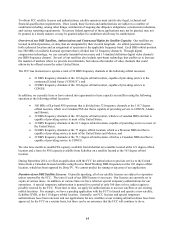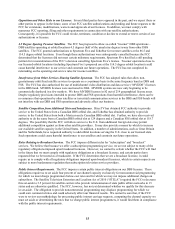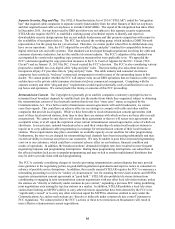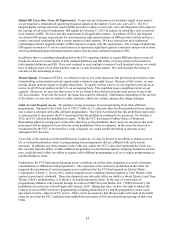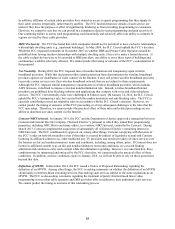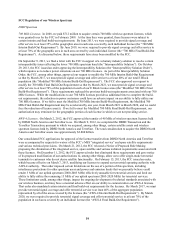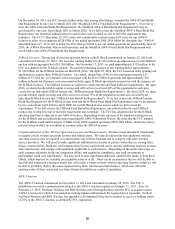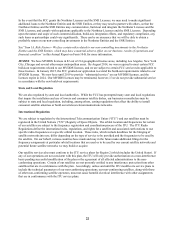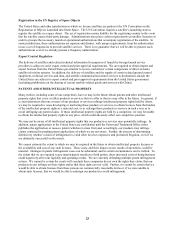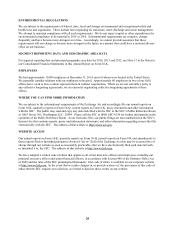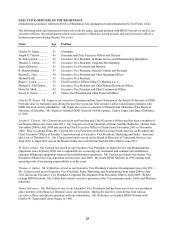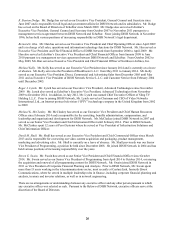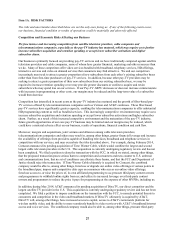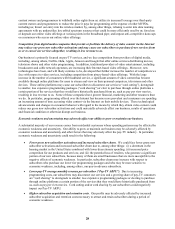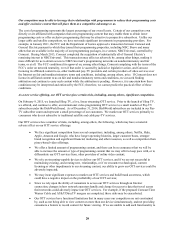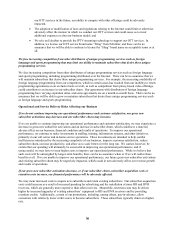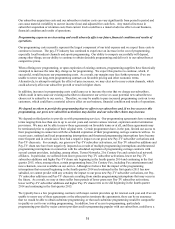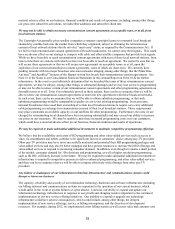Dish Network 2014 Annual Report Download - page 33
Download and view the complete annual report
Please find page 33 of the 2014 Dish Network annual report below. You can navigate through the pages in the report by either clicking on the pages listed below, or by using the keyword search tool below to find specific information within the annual report.23
23
Registration in the UN Registry of Space Objects
The United States and other jurisdictions in which we license satellites are parties to the UN Convention on the
Registration of Objects Launched into Outer Space. The UN Convention requires a satellite’s launching state to
register the satellite as a space object. The act of registration carries liability for the registering country in the event
that the satellite causes third-party damage. Administrations may place certain requirements on satellite licensees in
order to procure the necessary launch or operational authorizations that accompany registration of the satellite. In
some jurisdictions, these authorizations are separate and distinct, with unique requirements, from the authorization
to use a set of frequencies to provide satellite services. There is no guarantee that we will be able to procure such
authorizations even if we already possess a frequency authorization.
Export Control Regulation
The delivery of satellites and related technical information for purposes of launch by foreign launch service
providers is subject to strict export control and prior approval requirements. We are required to obtain import and
export licenses from the United States government to receive and deliver certain components of direct-to-home
satellite television systems. In addition, the delivery of satellites and the supply of certain related ground control
equipment, technical services and data, and satellite communication/control services to destinations outside the
United States are subject to export control and prior approval requirements from the United States government
(including prohibitions on the sharing of certain satellite-related goods and services with China).
PATENTS AND OTHER INTELLECTUAL PROPERTY
Many entities, including some of our competitors, have or may in the future obtain patents and other intellectual
property rights that cover or affect products or services that we offer or that we may offer in the future. In general, if
a court determines that one or more of our products or services infringe intellectual property rights held by others,
we may be required to cease developing or marketing those products or services, to obtain licenses from the holders
of the intellectual property rights at a material cost, or to redesign those products or services in such a way as to
avoid infringing any patent claims. If those intellectual property rights are held by a competitor, we may be unable
to obtain the intellectual property rights at any price, which could adversely affect our competitive position.
We may not be aware of all intellectual property rights that our products or services may potentially infringe. In
addition, patent applications in the United States are confidential until the Patent and Trademark Office either
publishes the application or issues a patent (whichever arises first) and, accordingly, our products may infringe
claims contained in pending patent applications of which we are not aware. Further, the process of determining
definitively whether a claim of infringement is valid often involves expensive and protracted litigation, even if we
are ultimately successful on the merits.
We cannot estimate the extent to which we may be required in the future to obtain intellectual property licenses or
the availability and cost of any such licenses. Those costs, and their impact on our results of operations, could be
material. Damages in patent infringement cases can be substantial, and in certain circumstances can be trebled. To
the extent that we are required to pay unanticipated royalties to third parties, these increased costs of doing business
could negatively affect our liquidity and operating results. We are currently defending multiple patent infringement
actions. We cannot be certain the courts will conclude these companies do not own the rights they claim, that our
products do not infringe on these rights and/or that these rights are not valid. Further, we cannot be certain that we
would be able to obtain licenses from these persons on commercially reasonable terms or, if we were unable to
obtain such licenses, that we would be able to redesign our products to avoid infringement.


